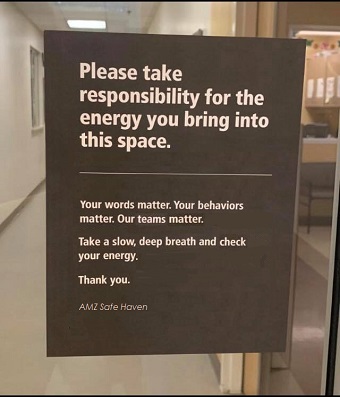|
Dealing with workplace mental health is one of
the most significant issues facing the business
sector as the pandemic and following deep
recession has accelerated an already growing
number of insurance claims related to
psychological health.
Burnout, stress, and anxiety were already issues
in the workplace prior to the pandemic and
recession.
With the pandemic's mental health impact now
into the mix work-related stress is reaching
staggering high levels. Business leaders are now
bracing themselves for continuing
aftershocks and looking at ways to meet a
dramatically heightened need for behavioral
support services.
Long term mental impact of pandemic and
recession
“There’s no doubt that the pandemic will be the
most psychologically toxic disaster in anyone’s
lifetime,” says Dr. Everly, who teaches mental
health and resilience at Johns Hopkins. “This
pandemic is a disaster of uncertainty, and the
greater the uncertainty surrounding a disaster,
the greater the psychological casualties.”
During this unprecedented time of uncertainty
and fear, mental health issues among people will
be exacerbated. Consequently, the pandemic
spotlights the critical need to accessing
workplace mental health support.
The latest Census Bureau survey showed that more
than one-third of Americans have displayed
clinical signs of anxiety, depression, or both
since the coronavirus pandemic began. A key
point is that only 50% of employees are
comfortable discussing mental health issues.
A recent poll, conducted by the American
Psychiatric Association, found that a third of
employees worry about retaliation or firing if
they seek mental health care. Psychological
safety, the freedom to authentically be yourself
at work, is increasingly recognized as a key
driver of engagement and innovation. In the
months and years ahead, that safety must include
feeling comfortable discussing mental health
issues.
Numerous studies show that the economic crisis
is an important stressor that has a negative
impact on workers’ mental health. Most of the
studies document an increased rate of mood
disorders, anxiety, depression, anxiety,
distress, and low self-esteem all negatively
affecting bottom-line performance. Fear of
illness and financial security for self, loved
ones and friends are key negative emotional
drivers of behavior. Some relevant studies show
that the long-term psychological consequences of
collective traumas can last a decade or more.
These are sobering facts, indeed. The need for
psychological support and solidarity will be
high for years to come. A growing number of
business leaders are now ensuring a full range
of mental health needs are adequately provided
to all their personnel. Any company that does
not have a holistic (brain-mind-body) employee
behavioral wellness program—one that includes
workshops, 1to1 and group performance behavioral
coaching -needs to immediately take this
opportune time to implement one.
The role for leaders is clear.
As forward-thinking leaders take inventory of
key assets, they are finding a better path that
emerges from uncertainty to security. Rather
than tweak the old rules to help business more
productive to stem losses, smart business
leaders are using this opportunity to develop
new growth development models for their people
—to enable a more resilient, caring and
generative relationship between business and
workers.
The need to rebalance priorities.
Business resilience and productivity, over time,
is a function of caring for the major input to
the business—its people.
Productivity boosting behaviors is not about
using outdated training, executive and team
coaching models of change.
To perform at a consistent, high level
requires the use of today’s,
evidence/science-based, brain-mind-body approach
using neuro-behavioral growth models and
techniques.
Leaders who step up and embrace the challenge of
creating work environments that meet these
fundamental needs will set their organizations
up for success and have the chance to make a
substantial contribution not just towards their
people’s long-term well-being but also to
bottom-line performance, productivity and the
organization’s future.
| |
|
|
|
 |
|
Safe Haven Sign at Entrance Door |
| |
What is High Performance Behavioral Coaching?
-
High Performance Behavioral Coaching falls under
the umbrellas of behavioral health and
performance enhancement. It provides unique
insights into the brain-mind-body connection,
brain plasticity, emotion, attention, peak
performance and physical health.
-
High Performance Behavioral Coaching provides a
positive alignment to an organization that
delivers a sense of security and allows
organizations to be more capable of dealing with
change via growth and/or disruption.
The Safe Haven Behavioral
Model
The Safe Haven Behavioral Coaching Model is
about:
-
helping all individuals find their way
along the right path of guidance and support
they require.
-
is a place where people
feel secure and protected from outside
dangers.
-
is a space where people
feel 100% safe and free to be themselves.
One
or more qualified, performance behavioral
coaches oversee the Safe Haven space and freely
provide guidance and counsel on a private,
one-to-one and group basis. Workers report
that it for helps restore hope, direction and
confidence in both their working and home life.
In large organizations a team of performance
behavioral coaches (full or part-time) provide
encouragement, positive advice and importantly
make no judgment on their client’s behavior.
The
responsibility for overseeing behavioral health
and performance for most smaller businesses is
typically outsourced to a certified behavioral
practitioner (external accredited performance
behavioral coach) rather than an extra member of
staff.
The performance behavioral coach provides
performance and behavioral health resources and
uses neuro-behavioral tools that increase
everyone’s emotional, physical and mental
well-being.
All personnel (leaders and
workers alike) are encouraged by their performance behavioral
coach towards what they can be with no limits or
boundaries to what they can achieve. The
performance behavioral coach is by their side in
both the good times and tough times -empowering
them to perform at the highest level, fulfil
their potential and enhance their overall
wellbeing and happiness.
High
Performance Behavioral Coaching = Next Generation
Coaching
High
Performance behavioral coaching not only
encompasses mental (mind) health but it takes a
holistic, three tier, brain-mind-body approach.
Yesterday’s missing corporate key for success
was ensuring people were provided the
brain-mind-body care and support they required
to be their healthy (mentally and physically)
best.
High Performance Behavioral Coaching:
-
- ignites
people’s well-being levels, creativity,
intuition, IQ, EQ, smart decision making and
output levels that transforms management and the
workforce to drive consistent, high productive
results and a happier, healthier environment.
-
- is a
developmental program for all persons and not
remedial focused. For example; it is used to
‘tune’ well-functioning brains to enhance a
person’s mental abilities and allow them to
perform at their peak.
Today, the exciting fields of neuroscience
and the behavioral sciences provides us powerful, safe and
easy-to-learn tools to generate changes in the
brain-mind-body continuum that produces real,
sustainable, measurable, positive physiological
and mental changes. This “new alliance” between
neuro-behavioral sciences and coaching places
the Behavioral Coaching Institute’s students at
the forefront in the world people development
field by providing them with cutting-edge,
proven, neuro-behavioral performance
interventions, tools and accredited,
internationally recognized credentials.
For over 25 years the
Behavioral Coaching Institute has been
the world leader in the development and
delivery of workplace, behavioral coach training
courses.
The Institute's unique, online, High
Performance
Behavioral Coach training
Course
teaches students to understand the
connection of the brain mind and body
and how to best help all people develop
to their next level and be
more capable of dealing with change via
growth and/or disruption.
|













